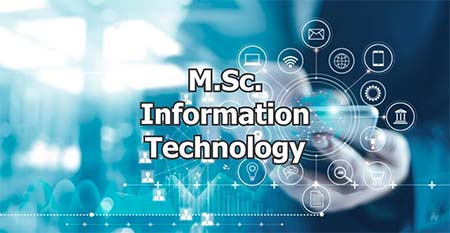An Introduction to Information Technology (IT)
Information technology (IT) is a branch of engineering that deals with functioning of different computers, storage devices, networking technologies along with many other physical devices that can be used to exchange all forms of electronic data in an organisation. Typically, information Technology (IT) is used in the context of enterprise operations unlike personal or entertainment needs. The IT Industry evolved in the mid-20 th century and today it's leading the world. Nearly 70% of the technologies of industries are dependent on the IT industry and it is considered as the most emerging field that further continues to have dominance in all countries of the world.
Few lines about M.Sc Information technology
M.Sc Information Technology (IT) is a 2-years post graduate programme that is divided into 4- semesters. The course is established to provide theoretical and practical knowledge related to various technologies like data mining and controlling of software applications. The M.Sc Information Technology (IT) students will be learning to solve the Information Technology (IT) related issues at the workplace using Object Oriented Programming (OOPs) algorithms and other networking solutions. They also learn about data management, tree traversal, heaps, dictionaries, depth-first search, breadth-first search and many other technologies during the course.
The M.Sc Information Technology (IT) students also learn various methods of software programming like traversal algorithms, control of IT functions and cloud computing, etc with the use of latest technology and latest software development.
Eligibility for M.Sc Information technology (IT)
The basic eligibility for M.Sc Information technology is:
- Students should have studied PUC or 10+2 with any three subjects of Physics, Mathematics, Chemistry, Electronics, Computers, Statistics as core subjects from a recognised board.
- The students should have completed their bachelor’s degree in information technology/computer science/physics/statistics/electronics with a minimum of 45% aggregate from a recognised university.
- B.Tech or BE degree holders in Computer Science/Information Technology are also eligible for M.Sc Information Technology (IT) course.
Admissions to M.Sc Information Technology (IT)
The degree students can get admissions to M.Sc Information Technology (IT) course via two modes of admissions (1) Merit Admissions (2) Direct Admissions under management quota
1. Merit Admissions
There are some colleges that offer admissions only after the clearance of entrance exams and based on the marks obtained in their degree. This procedure is termed as merit admissions. The main motto of the entrance exam is to filter out the best candidates from the rest of the aspirants. The students after the clearance of entrance exams are offered merit seats with nominal fee structure. The students who are confident can apply for merit seats and get admissions
2. Direct Admissions under Management Quota
However, there is also one more mode of admission that is direct admissions under management quota. The students can choose their seats in their desired colleges to study M.Sc Information technology (IT) under this option. The students can confirm their seats under management quota with the help of educational counselling centres. The advantage of this mode is that students are not required to go through any entrance exams (if any) and get directly admitted to the course even before the academic cycle. The interested students can contact us for getting direct admissions.
Syllabus for M.Sc Information Technology (IT)
The students of M.Sc Information Technology (IT) will be studying the following subjects:
- Fundamentals of Computers, Computer Graphics & Multimedia
- Introduction to Programming
- Information Technology, Planning and Re-engineering
- Organisational Dynamics
- Object Oriented Programming
- Strategic Management
- Software Engineering
- Innovative and Technology Management
- Database Management System, Structure and Algorithm
- Digital Logic
- Application Software Development
- Web Technology Concepts
- OS and Network Management
- Linux Administration and Linux Networking
- E-Governance Applications and Services
- Geographical Information Systems
- Data Warehousing and Data Mining Applications
- Advanced Software Engineering
- Mobile Computing
- Advanced Database Administration
- Cloud Technology and Internet of Things (IoT)
Scope for M.Sc Information Technology students
The M.Sc Information technology students can get lucrative jobs in all MNCs of the world. The students interested in further study can join M.Phil or PhD programmes and take up research in the field of information technology. They can join as lecturers in colleges and universities after the completion of M.Sc Information technology course. They can also start their own firms and work as consultants for top MNC’s.
Job Roles available after M.Sc Information Technology (IT)
There are several organisations that hire M.Sc Information Technology (IT) students across the globe. They are normally hired in top positions and are well paid. Some of the important job roles available are:
- Application Analyst
- Application Developer
- Business Analyst
- Cyber Security Analyst
- Data Analyst
- Database Administrator
- Game Developer
- IT Consultant
- Information Systems Manager
- Network Engineer
- Penetration Tester
- Systems Analyst
- Software Developer
Recruiting Firms
hiring M.Sc Information Technology (IT) students Some of the top recruiting firms hiring M.Sc Information Technology students are:
- Accenture
- IBM
- SAP
- Cisco
- Syska Technologies
- Cognizant
- Capgemini
- Infosys
- Wipro
- Sasken Technologies
- NTT Data
- Adobe
- HCL Technologies
- Hewlett Packard (HP)
- Microsoft
Final Words
Today, the world is ruled by IT products and services, so the demand for IT professionals is fairly large. The IT professionals are hired in almost all the organisations irrespective of the location they are situated. The M.Sc Information Technology (IT) students are also having good job prospects after the completion of their post-graduation. They mainly work in the networking side of an organisation and are responsible to solve the issues arising in enterprise networks. They are required to set up virtual networks for cloud systems and ensure that cloud softwares are working flawlessly. The present demand is for cloud-based technology and Internet of Things (IoT) and the M.Sc Information Technology (IT) students are now typically hired in this area by various organisations. The students who are passionate about networking and software can join M.Sc Information Technology (IT) and lead a fruitful career life.






